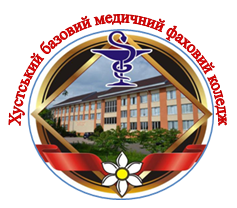Закарпатський базовий державний медичний коледж є правонаступником Хустської медичної школи медичних сестер.
В жовтні 1945 року на основі рішення уряду і наказу Закарпатського обласного виконкому (наказ №127 від 13 вересня 1945 р.) було відкрито Хустську школу медичних сестер на базі семи класів з дворічним терміном навчання. Приступило до навчання 60 учнів і вже в 1947 році видано перші дипломи медичних сестер.
У вересні 1953 року в школі відкрито акушерське відділення із трирічним терміном навчання на базі семи класів.
В червні 1954 року постановою Закарпатського обласного виконавчого комітету Хустська школа медичних сестер реорганізована в Хустське медичне училище з правом здійснювати підготовку за спеціальностями:
- «Медична сестра» (2 роки);
- «Фельдшер» (3 роки).
Навчальний корпус школи знаходився в одноповерховому пристосованому приміщенні по вул. Слов’янській і нараховував дев’ять аудиторій та дві лабораторії. Навчально-виховний процес здійснювали в 1946 році шість викладачів.
В 1983 році Хустське медичне училище відсвяткувало новосілля – перемістилось в новозбудований сучасний корпус.
Наказом МОЗ України в листопаді 1990 року училище визнано базовим для надання методичної допомоги медичним училищам області.
Рішенням Закарпатської обласної ради від 21 грудня 2001 року Хустське базове медичне училище реорганізовано в Закарпатський базовий державний медичний коледж з ліцензією на право провадження освітньої діяльності зі спеціальностей: «Фармація» та «Сестринська справа» на базі молодшого спеціаліста (бакалавр). Коледжу надано статус вищого навчального закладу I – II рівня акредитації.
У червні 2004 року створено відділення післядипломної освіти з напрямів «Медицина» та «Фармація».
Закарпатський базовий державний медичний коледж на даному етапі здійснює підготовку фахівців з напрямів «Медсестринство» та «Фармація» за такими спеціальностями: Сестринська справа, Лікувальна справа, Акушерська справа, Фармація, промислова фармація.
Public Institution “Khust Basic Professional Medical College” of Transcarpathian Regional Council is the legal successor of The Transcarpathian Basic State Medical College and the Khust Medical School of Nursing. In October 1945, based on the decision of the government and the order of the Transcarpathian Regional Executive Committee (order No. 127 of September 13, 1945), the Khust School of Nursing was opened on the basis of seven classes with a two-year term of study. 60 students began their studies and already in 1947 the first nursing diplomas were issued. In September 1953, the midwifery department was opened at the school with a three-year term of study on the basis of seven classes. In June 1954, by resolution of the Transcarpathian Regional Executive Committee, the Khust School of Nursing was reorganized into the Khust Medical School with the right to train in the following specialties: • “Nurse” (2 years of studying); • “Medical assistant (Paramedic)” (3 years of studying). The educational building of the school was located in a one-story building in the street Slovyanska and had nine classrooms and two laboratories. The educational process was carried out in 1946 by six teachers. In 1983, the Khust Medical School celebrated its housewarming – it moved into a newly constructed modern building. By order of the Ministry of Health of Ukraine in November 1990, the school was recognized as a basic school for providing methodological assistance to medical schools of the region. By the decision of the Transcarpathian Regional Council dated December 21, 2001, the Khust basic medical school was reorganized into the Transcarpathian basic state medical college with a license for the right to conduct educational activities in the specialties “Pharmacy” and “Nursing” on the basis of a junior specialist (bachelor). The college has been granted the status of a higher educational institution of the I-II level of accreditation. In June 2004, the department of postgraduate education in the areas of “Medicine” and “Pharmacy” was created. The educational institution currently trains specialists in the fields of “Nursing” and “Pharmacy” in the following specialties Nursing, Medicine, Midwifery, Pharmacy, Industrial Pharmacy




















